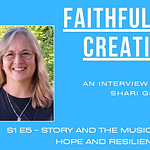There are certain Christian traditions that seem to talk about how we need more “Bible-based teaching.” These same traditions that tend to indicate that they are elevating the Bible and take pride in “understanding the Bible literally” or, if they actually deign to admit that it is impossible to take the entire Bible literally because, well, least of all, there are poems in the Bible (even an entire book of poetry called the Psalms) and you can’t actually take a poem literally or you’ve totally missed the point, then they will instead declare that they, and maybe only they, are “taking the Bible seriously.”

Some of these same traditions have churches and leaders who have done things like silence women, perpetuate abuse and discrimination, gather enormous wealth, or created their own kingdoms and then done what is “necessary” to protect them. (See the Secrets of Hillsong documentary, and the Rise and Fall of Mars Hill podcast)
I’m not usually one to criticize other Christian traditions, but my aggravation at the way certain segments of the Christian Church are seen as representative of the entire Christian Tradition has grown in recent years. I usually want to try and just get along. Let’s just keep talking about grace and do our best to love one another. But still, I have become sick of a term like “Bible-believing” being far-too-often a code for a supposed God-sanctioned exclusion of anyone who is not a white man.
How is it that “Bible-believing” has come to mean in some circles that because there are a few places in the New Testament that have references like “women be silent in church” or “wives submit to your husbands” that that gives “wise male leaders” the right to subjugate women and pretty much anyone else they deem “less than” by using an institution that is actually meant to represent a community that is also described in that same New Testament as one where “there is no longer male and female; for all of you are one in Christ Jesus?” (Galatians 3:28)
If I’m a leader in a true “Bible-believing church,” shouldn’t I be shining a light on ALL the heroes of the faith, instead of just a select few? How about people like Sarah, Deborah, Hannah, Ruth, Naomi, or Elizabeth, just to name a few?
And indeed what about Mary? Should we silence Jesus’ mother in the church? In some churches it seems so, because how can Mary’s song be heard as anything other than just a personal song of praise (I guess women are allowed to have those) in places that continue to perpetuate power for the few at the expense of others?
Mary sings - and I’m just quoting the Bible here…
He has brought down the powerful from their thrones
and lifted up the lowly;
he has filled the hungry with good things
and sent the rich away empty. (Luke 1:52-53)
Hmm. I’m thinking there words are a little hard to swallow while flying in your private jet to your next speaking gig at the Bible believing mega-church where your college buddy is the head pastor?
I’m sick of seeing Christianity being portrayed as synonymous with corruption, abuse, discrimination, and the like. And I don’t want to defend the religion of Christianity. I want to instead point to the Bible, not as a proof-text about how to see things my way, but because it has a ton to say against the corruption of power, especially when that power is claimed as divine right.
As a Christian, I am supposed to see things through the lens of Jesus Christ and Jesus didn’t do any of the manipulating, excluding, discriminating, or defending or bolstering of his power or authority that you see among church leadership in certain circles. Sure, we can say, that if Jesus is God incarnate, then he simply **has** all power and authority (no defending needed), and we ought to just be obedient subjects. But interestingly, Jesus himself didn’t even make that argument.
He spoke of coming to serve and not be served. Instead of consolidating power and protecting his inner circle so that they would keep him in place so his religious movement would grow in numbers and also in political influence, Jesus was executed by a collusion of the state and religious powers of his day, and his inner circle was a scattered and broken mess (with one who denied he even knew Jesus, and another who betrayed him to the authorities).
Of course we know the ones who did stay true to Jesus even after he was arrested and given the death penalty. They were the same ones who God chose as the first people to go and tell Jesus’ other followers about the incredible news of him being raised from the dead. The real way the Jesus movement continued actually started with these people bringing this good news (Gospel!) and speaking it to other disciples. If that isn’t speaking in church I don’t know what is! These are the models for who should speak and to whom we ought to listen!
Matthew says it was “Mary Magdalene and the other Mary,” (Matthew 28:1) Mark says it was “, Mary Magdalene, and Mary the mother of James, and Salome,” (Mark 16:1), Luke says it was “Mary Magdalene, Joanna, and Mary the mother of James,” (Luke 24:10) and okay, John tells things a bit differently, but the key moment still involves Mary Magdalene as the central participant.
All four sources agree that the most important message to convey to “the church” was first entrusted to women. So how about we listen! How about we also listen to Mary’s song of justice? How about we listen to any woman who stands up to speak?
My own denomination has been ordaining women ministers since 1966, before I was born. I’ve never known a time when there weren’t women preachers. If you asked me to name you a few great pastors I know, the first few names out of my mouth would be Theresa, Heather, Jeya.
I am flabbergasted that something like it being wrong to bar people from leadership based on their gender is still something we have to make a point of saying. It’s enough to make someone walk away from this whole thing called Christianity. And people have. And people are.
Maybe you need to step away for a while. Or maybe you need to walk away from a segment of the Christian tradition where you have experienced hurt. I get it.
I pray, though, that you might still look for or stay in and work for a community where Mary’s song is taken just as seriously as everything else in the Bible, where the reality of women pastors and preachers is just a given. I pray that together we can listen, speak, and help create communities actually centred on Christ who gave up power, who became human, whose love is without condition or bounds—the communities of grace, compassion, and care that people so desperately need.












Share this post